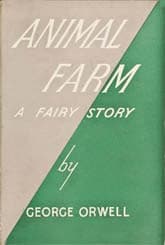Animal Farm
Critique • Quotes
 First edition
First editionOriginal title
Animal Farm: A Fairy Story
First publication
1945
Literature form
Novella
Genres
Literary, fantasy
Writing language
English
Author's country
England
Length
Approx. 32,000 words
A political fairy tale
Animal Farm is a work I include on the list of greatest works under protest.
It's not that I dislike George Orwell. I like most of his work very much. Nor do I consider Animal Farm particularly bad. It's very cleverly done for what it is.
But I suspect the qualities that have led to its iconic status—and to its placement at number 31 on the Modern Library list of top English-language novels of the twentieth century, ahead of some of the best works of Hemingway, Faulkner, Lawrence and Conrad—are polemical, rather than literary.
Not that I have anything against political works either, as many of my other favourite books should prove. But consider this: if Animal Farm were a satire on naked, rapacious capitalism, would it be called a modern classic today? How much does its reputation as an attack on communism and the Russian Revolution lead its admirers to overlook its slightness?
Furthermore, much of the admiration for Animal Farm comes from a misunderstanding of its political message. It is not, as many seem to think, a denunciation of revolution in general, nor of socialism in particular. Orwell was some kind of anarcho-syndicalist brand of socialist himself. His criticisms were directed from within the left at others on the left—namely, at those he considered traitors to the revolution.
The example of the pigs who end up living off the sweat of the other animals, just as the overthrown humans once did, is not meant to illustrate that all revolutions end up replacing one set of exploiters with another, but rather to warn those who would make revolution to beware would-be leaders who would use the revolution for their personal advantage. Centralized power was the danger Orwell saw the Soviet experiment falling prey to, as opposed to the grassroots collectivism he favoured.
If they bore this in mind, would conservative and liberal critics still consider Animal Farm a great read?
Or would they notice then that there is hardly any characterization in this story apart from some one-dimensional labelling. (Napoleon is supposedly a takeoff on Stalin, Snowball is Trotsky, Squealer is a conniving propagandist, Boxer is a simple and hardworking proletarian, etc.) Little insight into the human heart is revealed, except in the most simplistic, cynical terms: greed overcomes goodwill, people will believe anything. The plot of course is implausible in the extreme, except as an allegory.
Now this does not make the story bad as a fable. In fact, Orwell's subtitle for Animal Farm was A Fairy Story, which has been dropped for most editions around the world.
I happened to re-read the book recently while also dipping into Grimm's Fairy Tales. The juxtaposition made me notice that Animal Farm really works in this context, as a far-fetched story of talking animals representing the absurdly exaggerated characteristics of humans, with a moral to be decoded from its conclusion. Which is fine and good. I appreciate it.
This is not enough though to place it among the greatest literature of modern times.
— Eric
Critique • Quotes

